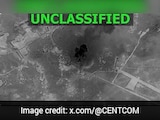New Orleans:
Hurricane Isaac slammed into the southern Louisiana coast late on Tuesday, sending floodwaters surging and unleashing fierce winds, as residents hunkered down behind boarded-up windows. New Orleans calmly waited out another storm on the eve of the devastating Hurricane Katrina's seventh anniversary, hoping the city's strengthened levees will hold.
Isaac, a massive Category I hurricane spanning nearly 200 miles (320 Kilometres) from its center, made landfall at about 6:45 pm local time (2345 GMT) near the mouth of the Mississippi River. But it was zeroing in on New Orleans, about 75 miles (120 Kilometres) to the northwest, turning streets famous for all-hours celebrations into ghost boulevards.
The storm drew intense scrutiny because of its timing - just before the anniversary of the hurricane that New Orleans - while the first major speeches of the Republican National Convention went on in Tampa, Florida, which had already been delayed and tempered by the storm.
While many residents stayed put, evacuations were ordered in low-lying areas of Louisiana and Mississippi, where officials closed the state's 12 shorefront casinos. By late Tuesday, more than 200,000 homes and businesses had lost power.
Ed Rappaport, deputy director of the National Hurricane Centre, said Isaac's core would pass west of New Orleans with winds close to 80 mph (130 kph) and head for Baton Rouge.
"On this course, the hurricane will gradually weaken. Its winds will come down," Rappaport said on Tuesday night from the Miami-based centre. He said gusts could reach about 100 mph (160 kph) at times, especially at higher levels which could damage high-rise buildings in New Orleans.
As Isaac neared the city, there was little fear or panic. With New Orleans' airport closed, tourists retreated to hotels and most denizens of a coastline that has witnessed countless hurricanes decided to ride out the storm.
"Isaac is the son of Abraham," said Margaret Thomas, who was trapped for a week in her home in New Orleans' Broadmoor neighbourhood by Katrina's floodwaters, yet chose to stay put this time. "It's a special name that means 'God will protect us'."
Officials, mortified by memories and experience, advised caution.
"We don't expect a Katrina-like event, but remember there are things about a Category 1 storm that can kill you," New Orleans Mayor Mitch Landrieu said, urging people to use common sense and to stay off any streets that may flood.
Tens of thousands of people were told to leave low-lying areas, including 700 patients of Louisiana nursing homes, but officials decided not to call for mass evacuations like those that preceded Katrina, which packed 135 mph (217 kph) winds in 2005.
Isaac also promised to test a New Orleans levee system bolstered after the catastrophic failures during Hurricane Katrina. But in a city that has already weathered Hurricane Gustav in 2008, calm prevailed.
"I feel safe," said Pamela Young, who settled in to her home in the Lower 9th Ward - a neighbourhood devastated by Katrina - with her dog Princess and television, waiting for the storm. "Everybody's talking 'going, going,' but the thing is, when you go, there's no telling what will happen. The storm isn't going to just hit here."
Young, who lives in a new, two-story home built to replace the one destroyed by Katrina, said she wasn't worried about the levees.
"If the wind isn't too rough, I can stay right here," she said, tapping on her wooden living room coffee table. "If the water comes up, I can go upstairs."
While far less powerful than Katrina, Isaac posed similar political challenges, a reminder of how the storm seven years ago became a symbol of government ignorance and ineptitude.
Political fallout was already simmering. Louisiana's Republican Gov. Bobby Jindal, who cancelled his trip to the convention, said the Obama administration's disaster declaration fell short of the federal help he had requested, and asked for a promise to be reimbursed for storm preparation costs.
"We learned from past experiences, you can't just wait. You've got to push the federal bureaucracy," Jindal said.
Federal Emergency Management Agency Administrator Craig Fugate said such requests would be addressed after the storm.
President Barack Obama promised that Americans will help each other recover, "no matter what this storm brings."
"When disaster strikes, we're not Democrats or Republicans first, we are Americans first," Obama said at a campaign rally at Iowa State University. "We're one family. We help our neighbours in need."
The storm's landfall didn't appear to affect prime-time television coverage of the Republican National Convention, where Ann Romney and New Jersey Gov. Chris Christie were to speak after a day of delays.
While politicians from both parties were careful to show their concern for those in the storm's path, Gulf residents and visitors tried to make the best of the situation on the ground.
In New Orleans' French Quarter, Hyatt hotel employee Nazareth Joseph braced for a busy week and fat overtime paychecks. Joseph said he was trapped in the city for several days after Katrina and helped neighbours escape the floodwaters.
"We made it through Katrina; we can definitely make it through this. It's going to take a lot more to run me. I know how to survive," he said.
Tourists seemed to be taking Isaac in stride.
Maureen McDonald of Long Beach, Indiana, strolled the French Quarter on her 80th birthday wearing a poncho and accompanied by family who travelled from three different cities to meet her in New Orleans to celebrate.
"The storm hasn't slowed us down. We're having the best time."
But farther east along the Gulf, veterans of past hurricanes, made sure to take precautions.
At a highway rest stop in Alabama, Bonnie Schertler, 54, of Waveland, Mississippi, said she left her coastal home for her father's place in Alabama "because of the 'clouds.'"
"I just feel like the storm may stay for a few days and that wind might just pound and pound and pound and pound," said Schertler, whose former home in Waveland was destroyed by Hurricane Katrina. A slow storm is more dangerous, she said, "'cause it can knock down just virtually everything if it just hovers forever."
Isaac, a massive Category I hurricane spanning nearly 200 miles (320 Kilometres) from its center, made landfall at about 6:45 pm local time (2345 GMT) near the mouth of the Mississippi River. But it was zeroing in on New Orleans, about 75 miles (120 Kilometres) to the northwest, turning streets famous for all-hours celebrations into ghost boulevards.
The storm drew intense scrutiny because of its timing - just before the anniversary of the hurricane that New Orleans - while the first major speeches of the Republican National Convention went on in Tampa, Florida, which had already been delayed and tempered by the storm.
While many residents stayed put, evacuations were ordered in low-lying areas of Louisiana and Mississippi, where officials closed the state's 12 shorefront casinos. By late Tuesday, more than 200,000 homes and businesses had lost power.
Ed Rappaport, deputy director of the National Hurricane Centre, said Isaac's core would pass west of New Orleans with winds close to 80 mph (130 kph) and head for Baton Rouge.
"On this course, the hurricane will gradually weaken. Its winds will come down," Rappaport said on Tuesday night from the Miami-based centre. He said gusts could reach about 100 mph (160 kph) at times, especially at higher levels which could damage high-rise buildings in New Orleans.
As Isaac neared the city, there was little fear or panic. With New Orleans' airport closed, tourists retreated to hotels and most denizens of a coastline that has witnessed countless hurricanes decided to ride out the storm.
"Isaac is the son of Abraham," said Margaret Thomas, who was trapped for a week in her home in New Orleans' Broadmoor neighbourhood by Katrina's floodwaters, yet chose to stay put this time. "It's a special name that means 'God will protect us'."
Officials, mortified by memories and experience, advised caution.
"We don't expect a Katrina-like event, but remember there are things about a Category 1 storm that can kill you," New Orleans Mayor Mitch Landrieu said, urging people to use common sense and to stay off any streets that may flood.
Tens of thousands of people were told to leave low-lying areas, including 700 patients of Louisiana nursing homes, but officials decided not to call for mass evacuations like those that preceded Katrina, which packed 135 mph (217 kph) winds in 2005.
Isaac also promised to test a New Orleans levee system bolstered after the catastrophic failures during Hurricane Katrina. But in a city that has already weathered Hurricane Gustav in 2008, calm prevailed.
"I feel safe," said Pamela Young, who settled in to her home in the Lower 9th Ward - a neighbourhood devastated by Katrina - with her dog Princess and television, waiting for the storm. "Everybody's talking 'going, going,' but the thing is, when you go, there's no telling what will happen. The storm isn't going to just hit here."
Young, who lives in a new, two-story home built to replace the one destroyed by Katrina, said she wasn't worried about the levees.
"If the wind isn't too rough, I can stay right here," she said, tapping on her wooden living room coffee table. "If the water comes up, I can go upstairs."
While far less powerful than Katrina, Isaac posed similar political challenges, a reminder of how the storm seven years ago became a symbol of government ignorance and ineptitude.
Political fallout was already simmering. Louisiana's Republican Gov. Bobby Jindal, who cancelled his trip to the convention, said the Obama administration's disaster declaration fell short of the federal help he had requested, and asked for a promise to be reimbursed for storm preparation costs.
"We learned from past experiences, you can't just wait. You've got to push the federal bureaucracy," Jindal said.
Federal Emergency Management Agency Administrator Craig Fugate said such requests would be addressed after the storm.
President Barack Obama promised that Americans will help each other recover, "no matter what this storm brings."
"When disaster strikes, we're not Democrats or Republicans first, we are Americans first," Obama said at a campaign rally at Iowa State University. "We're one family. We help our neighbours in need."
The storm's landfall didn't appear to affect prime-time television coverage of the Republican National Convention, where Ann Romney and New Jersey Gov. Chris Christie were to speak after a day of delays.
While politicians from both parties were careful to show their concern for those in the storm's path, Gulf residents and visitors tried to make the best of the situation on the ground.
In New Orleans' French Quarter, Hyatt hotel employee Nazareth Joseph braced for a busy week and fat overtime paychecks. Joseph said he was trapped in the city for several days after Katrina and helped neighbours escape the floodwaters.
"We made it through Katrina; we can definitely make it through this. It's going to take a lot more to run me. I know how to survive," he said.
Tourists seemed to be taking Isaac in stride.
Maureen McDonald of Long Beach, Indiana, strolled the French Quarter on her 80th birthday wearing a poncho and accompanied by family who travelled from three different cities to meet her in New Orleans to celebrate.
"The storm hasn't slowed us down. We're having the best time."
But farther east along the Gulf, veterans of past hurricanes, made sure to take precautions.
At a highway rest stop in Alabama, Bonnie Schertler, 54, of Waveland, Mississippi, said she left her coastal home for her father's place in Alabama "because of the 'clouds.'"
"I just feel like the storm may stay for a few days and that wind might just pound and pound and pound and pound," said Schertler, whose former home in Waveland was destroyed by Hurricane Katrina. A slow storm is more dangerous, she said, "'cause it can knock down just virtually everything if it just hovers forever."















